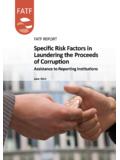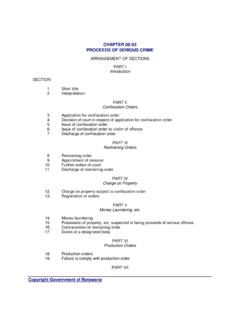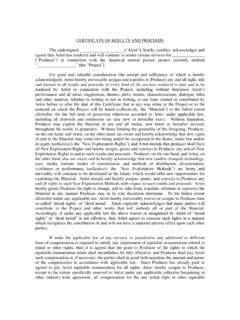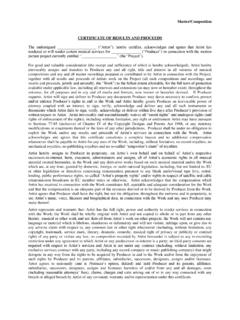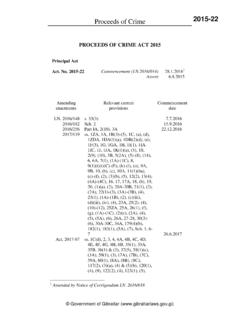Transcription of Internal Revenue Service Department of the Treasury
1 Internal Revenue ServiceDepartment of the TreasuryWashington, DC 20224 Number: 201235006 Release Date: 8/31/2012 Index Number: , , , , Party Communication: NoneDate of Communication: Not ApplicablePerson To Contact:-------------------, ID No. ----------Telephone Number:---------------------Refer Reply To:CC:PSI:4 PLR-136336-11 Date: FEBRUARY 27, 2012RE: ---------------------------------------- ------RE: ---------------------------------------- ------Legend:Taxpayer------------------- ------------------------------Grantors-- ------------------------------Trust A--------------------------------------- ---------------------------------------- ---------------------------------------- ------------------------------Trust B-------------------------Date ---------------------------State-------- -State Statutes 1-12 ---------------------------------------- ---------------------------------------- -------------------State Statute 8--------------------------------------- -------------------------------------- Dear.
2 This letter responds to your letter dated August 26, 2011, requesting rulings under 101, 675, 2033, 2036, 2038, and 2042 of the Internal Revenue Date, Grantors established Trust A, an irrevocable trust, for the primary benefit of Taxpayer. Taxpayer s brother was named initial trustee of Trust A. During the life of Taxpayer, the trustee has discretion to distribute trust assets to Taxpayer and Taxpayer s descendents for their support, maintenance, health, and education in a reasonable standard of living. Trust A will terminate upon the death of Taxpayer and the remaining trust assets are to be distributed to Taxpayer s descendents. Taxpayer has not represented that Taxpayer or any other individual is treated as the owner of the Trust A under subpart E of part 1 of subchapter J of the established Trust B, an irrevocable trust, for the benefit of Taxpayer s descendents.
3 Taxpayer has one daughter and one granddaughter. Daughter is the PLR-136336-112named trustee (Trustee) of Trust B. Taxpayer is prohibited from serving as a III(A)(1) of Trust B provides that during Taxpayer s life, the trustee (excluding any Insured Trustee) has discretion to distribute to Taxpayer s descendents net income and principal for their health, education, maintenance and support in their accustomed manner of living. Article III(A)(2) provides that the trustee (excluding any Trustee that is related to or subordinate to the Taxpayer and any Interested or Insured Trustee) may also distribute to Taxpayer s descendents so much of the net income and/or principal of the trust as the trustee may from time to time select, for any purpose. Article III(B) provides that upon Taxpayer s death, the remaining trust estate is to be divided into perstirpital shares for Taxpayer s living descendents and held in further trust.
4 Article VIII provides that the trustee may acquire and retain life insurance on the life of any individual (or the joint lives of any individuals) in which any beneficiary has an insurable interest. The trustee, excluding any trustee related to or subordinate to the Taxpayer and anyInsured Trustee (who shall not participate in any decision involving a life insurance policy on such trustee s life or its proceeds), shall have all rights of an owner over life insurance policies assigned to or otherwise owned by Trust IX provides the maximum duration of trust is the longest period that property may be held in trust under the applicable rules governing perpetuities, vesting, accumulations, the suspension of alienation and the like (including any applicable period in gross such as twenty-one (21) years or ninety (90) years.)
5 Article X provides that the trustee shall not reimburse Taxpayer from assets of the trust for the Taxpayer s income tax on the amount (if any) of the gross income of the trust that is reportable directly on the Taxpayer s return under XIII provides that Trust B is irrevocable. Taxpayer has no right to alter or amend Trust B in any way. None of the income or principal from Trust B may be payable to Taxpayer or be used to discharge any obligation of Taxpayer, Taxpayer s creditors, Taxpayer s estate, or the creditors of Taxpayer s XV provides, in part, that a trustee may appoint successor trustees. No successor trustee or co-trustee appointed by a beneficiary shall be a person or entity that is related or subordinate to such beneficiary within the meaning of 672(c) and the regulations XVI(F)(1) provides that the term Interested Trustee means a person who is, or in the future may be, eligible to receive income or principal pursuant to the terms of the trust.
6 If all trustees serving under the terms of the trust are Interested Trustees, a court may appoint a special trustee to serve and exercise the powers of a Disinterested Trustee, , a person who is not an Interested XVI(F)(2) provides that the term Insured Trustee means a Trustee who is the insured (or one of the insured) under a policy of life insurance held in the trust. No Insured Trustee may participate in the exercise of any incident of ownership over any policy that insures the life of such XVI(F)(12) provides that the trustee is prohibited from making, voting on or otherwise participating in any discretionary distribution of income or principal from a trust that would discharge or substitute for a legal obligation of that trustee, including the obligation to support a beneficiary of the XVI(H) provides that the grantor shall have no right, either alone or in conjunction with any other person(s)
7 To revoke, amend or modify this agreement or any trust created by XVII provides that the trust shall be governed by the laws of XVIII grants a right of withdrawal to each of Taxpayer s children and grandchildren limited by the gift tax annual exclusion in effect at the time of each contribution and subject to lapse at the end of each calendar year, or if earlier, thirty (30) days after the contribution to which it relates in an amount equal to the greater of the sums referred to in 2514(e). Article XIX provides that Taxpayer has the power, exercisable at any time and from time to time in a nonfiduciary capacity (within the meaning of 675(4)), without the approval or consent of any person in a fiduciary capacity within the meaning of 675(4), to acquire or reacquire any asset or assets forming part of the trust estate by substituting other property of an equivalent value.
8 Taxpayer shall exercise this power to substitute property by certifying in writing that the substituted property and the trust property for which it is substituted are of equivalent value, and the Trustee shall have a fiduciary obligation to ensure Taxpayer s compliance with the terms of this power by being satisfied in advance of completing the substitution that the properties acquired and substituted are in fact of equivalent value, within the meaning of Rev. Rul. 2008-22. This power cannot be exercised in a manner that can shift benefits among the trust beneficiaries. Trust A owns a life insurance policy on the life of Taxpayer. Trust A intends to sell its interest in the policy to Trust B for an amount equal to the value of Trust A s interest in the policy as determined under (a) of the Gift Tax Regulations.
9 The trustee of Trust A will obtain from the issuing insurance company the interpolated terminal insurance reserve value for the policy as of the date of sale and use that amount, plus the proportionate amount of premium last paid before the sale that covers the premium extending beyond the date of sale as the purchase price. Taxpayer will fund Trust B with the amount necessary to purchase the policy. The trustee of Trust B PLR-136336-114will be designated as the beneficiary of the policy. Trust B may incur debt or policy loans as part of the administration of Trust Statutes 1-12 invokes the prudent investor rules on Statute 8 provides that if a trust has two or more beneficiaries, the trustee shall act impartially in investing and managing the trust assets, taking into account any differing interests of the request the following rulings:1.
10 Trust B will be treated as a grantor trust with respect to Taxpayer as a result of the application of either/both 674 or/and Taxpayer s daughter and granddaughter will not be treated as grantors of Trust B during the life of Taxpayer as a result of any withdrawal right they may have with respect to contributions made to Trust The proposed sale to Trust B of the policy is either not a transfer for valuable consideration under 101(a)(2) or, in the alternative, will satisfy the requirements of 101(a)(2)(B), and therefore, will not affect the application of 101(a)(1) to policy proceeds that Trust B will receive under the insurance contract it proposes to purchase from the Trust A. 4. The death of Taxpayer will not be considered as a transfer that could result in a transfer for valuable consideration of the life insurance contract under the provisions of 101(a)(2), and as a result, under 101(a)(1) the proceeds from the life insurance contract payable by reason of Taxpayer s death will not be included in the gross income of Trust B even if the life insurance contract is subject to debt or policy loans at the death of The power to reacquire the corpus of Trust B by substituting other property of an equivalent value will not result in Taxpayer possessing incidents of ownership under 2042(2) in the policy6.










